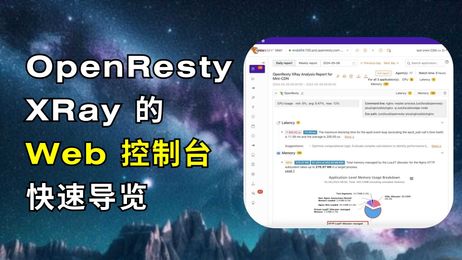OpenResty XRay 助力 LLVM clang 性能优化实践
Dynamic Routing Based On Redis
Yichun Zhang , 14 Sep 2011 (created 27 Jul 2011)This sample demonstrates how to use redis to route incoming requests to different
HTTP backends based on the requests' User-Agent header.
This demo uses the modules Redis2 Nginx Module, Lua Nginx Module, Lua Redis Parser Library, and Set Misc Nginx Module bundled by OpenResty:
Here's the complete code listing for our nginx.conf:
worker_processes 1;
error_log logs/error.log info;
events {
worker_connections 1024;
}
http {
upstream apache.org {
server apache.org;
}
upstream nginx.org {
server nginx.org;
}
server {
listen 8080;
location = /redis {
internal;
set_unescape_uri $key $arg_key;
redis2_query get $key;
redis2_pass 127.0.0.1:6379;
}
location / {
set $target '';
access_by_lua '
local key = ngx.var.http_user_agent
local res = ngx.location.capture(
"/redis", { args = { key = key } }
)
print("key: ", key)
if res.status ~= 200 then
ngx.log(ngx.ERR, "redis server returned bad status: ",
res.status)
ngx.exit(res.status)
end
if not res.body then
ngx.log(ngx.ERR, "redis returned empty body")
ngx.exit(500)
end
local parser = require "redis.parser"
local server, typ = parser.parse_reply(res.body)
if typ ~= parser.BULK_REPLY or not server then
ngx.log(ngx.ERR, "bad redis response: ", res.body)
ngx.exit(500)
end
print("server: ", server)
ngx.var.target = server
';
proxy_pass http://$target;
}
}
}
And then let's start the redis server on the localhost:6379:
$ ./redis-server # default port is 6379
and feed some keys into this using the redis-cli utility:
$ ./redis-cli
redis> set foo apache.org
OK
redis> set bar nginx.org
OK
And then let's test our nginx app!
$ curl --user-agent foo localhost:8080
<apache.org home page goes here>
$ curl --user-agent bar localhost:8080
<nginx.org home page goes here>
To further tune the performance, one could enable the connection pool for the redis connections, as documented in Redis2 Nginx Module's README.

























